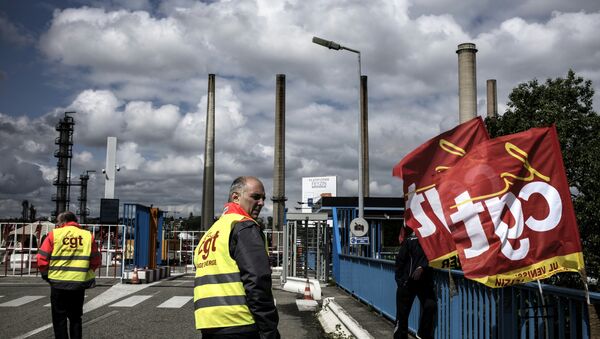DOHA (Sputnik) Anastasia Dmitrieva — France’s decision to end oil and gas production in the country by 2040 cannot be taken as an example to follow by other countries wishing to meet the Paris climate deal targets, as the production in France is already much lower than in other states in Europe and elsewhere, newly-appointed Gas Exporting Countries Forum (GECF) Secretary General Yuri Sentyurin told Sputnik in an interview on Wednesday.
Last month, the National Assembly, the lower house of the French parliament, approved a law that provides for the gradual abandonment of the exploration and production of oil, gas and coal by 2040, linking the legislation with the obligations taken within the Paris climate accord.
"In my opinion, this cannot be taken as a model to follow, as the production of natural gas in France is meager and represents only 1 percent of its consumption. This is not comparable with other production in Europe and/or elsewhere in the world," Sentyurin said, asked if more countries may follow France’s example in the future.
Nevertheless, the ban on the renewal of any existing concessions and the end of granting new oil and gas exploration licenses, in order to end oil and gas production in the country by 2040, was "a sovereign decision of a country that is among the leaders of the transition to green economy in Europe", the GECF head added.
READ MORE: France Engages in Development of Iranian Gas Fields as US Mulls New Sanctions
The Paris Agreement, signed by more than 190 parties and ratified by 174, was adopted within the United Nations Framework Convention on Climate Change in December 2015 and came into force in November 2016. The main goal of the Paris accord is to tackle climate change by slowing down the rise in global temperature.
New Members of Organization
GECF head added that at the moment it is a priority to increase the number of members in the organization.
"If they understand that an organization of such type as GECF is interesting for them to be members of, they are welcome," Sentyurin, who assumed office on January 1 for a two-year term, said.
He went on to say that despite the "evil" competition, GECF should additionally cooperate with the United States on gas and matters of mutual concern.
"We need more opportunities for cooperating, because we are working on the same markets. That’s why I’m going to participate in CERAWeek in March in order to have meetings, for me first meetings in such a role as Secretary General, with relevant persons from the gas world from the North America," Sentyurin said, adding that it would also be useful to have a meeting with US Secretary of Energy Rick Perry.
READ MORE: Economist: US Shale Industry Takes Side of Russia, OPEC
OPEC Cooperation
The Organization of the Petroleum Exporting Countries (OPEC) is considering signing a memorandum of understanding with the Gas Exporting Countries Forum (GECF) to formalize cooperation in the field of hydrocarbon energy, newly-appointed GECF Secretary General Yuri Sentyurin told Sputnik in an interview on Wednesday.
"We suggested to Mr. Barkindo and his team to think over a MoU, a memorandum of understanding, in the field of cooperation between organizations. Mr. Barkindo confirmed that he received the draft of the MoU, for the time being, the draft is under consideration," Sentyurin, former Russian Deputy Energy Minister, said, adding that the main idea was to formalize previous contacts in workshops and seminars, as well as to compare outlooks on energy.
He added that all contacted ministers of GECF, some of which are also OPEC member countries, had "unanimously supported the idea."
"We need to enrich our capabilities with the experience accumulated by OPEC… We try to determine specific means and tools of our cooperation through the meeting of our experts, arranging joint and common seminars, roundtables," the GECF chief added.
According to Sentyurin, the purpose of the forum is to avoid potential criticism that GECF just like OPEC "wants to regulate energy markets."
The GECF is an intergovernmental organization established in May 2001, which currently has 12 member countries — Algeria, Bolivia, Egypt, Equatorial Guinea, Iran, Libya, Nigeria, Qatar, Russia, Trinidad and Tobago, Venezuela and the United Arab Emirates (UAE), as well as seven observer countries. The forum provides a framework for the exchange of views, experience and information, as well as for cooperation and collaboration among its members in the gas-related issues.
OPEC brings together 14 oil-producing countries, namely Algeria, Angola, Ecuador, Equatorial Guinea, Gabon, Iran, Iraq, Kuwait, Libya, Nigeria, Qatar, Saudi Arabia, the UAE and Venezuela. According to the organization's website, OPEC was created to ensure the coordination of oil-related activities of its member states.






